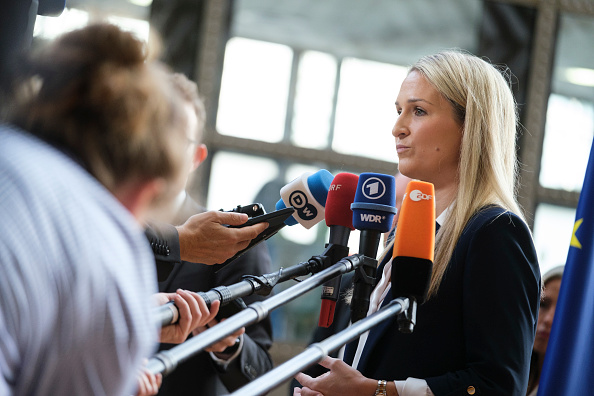France’s National Assembly has ousted Prime Minister Michel Barnier, with Marine Le Pen’s National Rally (RN) and La France Insoumise (LFI) finding 331 votes out of 577 in a no confidence motion.
Weeks after Olaf Scholz’s German coalition collapsed, France’s political crisis puts the EU’s two biggest members in disarray.
Le Pen had told France’s Télévision Française 1 the confidence motion was the “only dignified solution” rather than a “victory”.
Speaking before the vote on December 4 she said Barnier’s removal “will be the real shock of hope France is waiting for”, paraphrasing French President Emmanuel Macron’s comments about the official reopening of Notre Dame cathedral on December 8.
Following the no-confidennce vote, Macron said he would make a televised speech to the nation at 8pm on December 5. French media have suggested he may nominate former Socialist prime minister Bernard Cazeneuve or a political ally such as Sébastien Lecornu or François Bayrou to replace Barnier.
But with the hard-left and hard-right blocs unlikely to agree on any candidate, Macron may face a potentially impossible task in finding a new prime minister to steer through the French budget, which legally must be passed by the end of the year.
Instead, he would likely face pressure to call early presidential elections before the end of his term in 2027. His last attempt to reshape French politics in his favour, by calling snap elections in July, instead saw the RN and LFI blocs gain seats in what became a hung parliament.
Le nouveau Premier ministre devra discuter avec l'ensemble des forces de l'Assemblée nationale pour travailler à un compromis sur le budget.
Il faut que les élus soient écoutés et entendus. C'est la démocratie. pic.twitter.com/I382AXufTA
— Marine Le Pen (@MLP_officiel) December 4, 2024
Only 211 legislators supported Barnier’s government, shy of a 289 majority. A left-wing bloc dominated by LFI had 192 seats, while RN and its allies had 140.
While the left-wing and right-wing blocs together enjoyed a 332-vote majority, they were always unlikely to co-operate in supporting a replacement government. Before the no-confidence vote, Le Pen had attacked LFI as “carnival Che-Guevarists”.
Le Pen also took aim at Barnier’s “technocratic budget”, describing it as lacking “course or vision”. The budget included €60 billion in tax hikes and spending cuts intended to slash a deficit that had reached 6 per cent of GDP. That would see France devoting more money to borrowing costs than to its defence budget.
After he presented his resignation to Macron at 10am on December 5, Barnier’s three-month term as PM made his tenure the shortest in the 66 years of the Fifth Republic, gaining the added distinction of being only the second to be forced from office after losing a confidence vote.
Dissolving the current National Assembly, though, would be impossible before July 2025, its President Yaël Braun-Pivet told the France Inter radio network on December 5.
He said Macron needed to “quickly” appoint a prime minister so as not to “let uncertainty” set in and to “reassure the French” about the functioning of their political institutions. “The institutions are solid, they are holding up. The President must first say that,” said Braun-Pivet.
Illustrating tthe difficulty in getting the National Assembly’s government-backing, left-wing, and right-wing factions to co-operate, Macron’s parliamentary supporters attacked the RN and LFI blocs.
On December 5, Violette Spillebout, a National Assembly member whose En Marche! Party supported Macron, posted on X that LFI’s “priority is not to work for the French people but to create chaos in the Assembly and the country”.
“The future prime minister will have to engage in effective negotiations with the support of the parliamentary groups,” she added.





